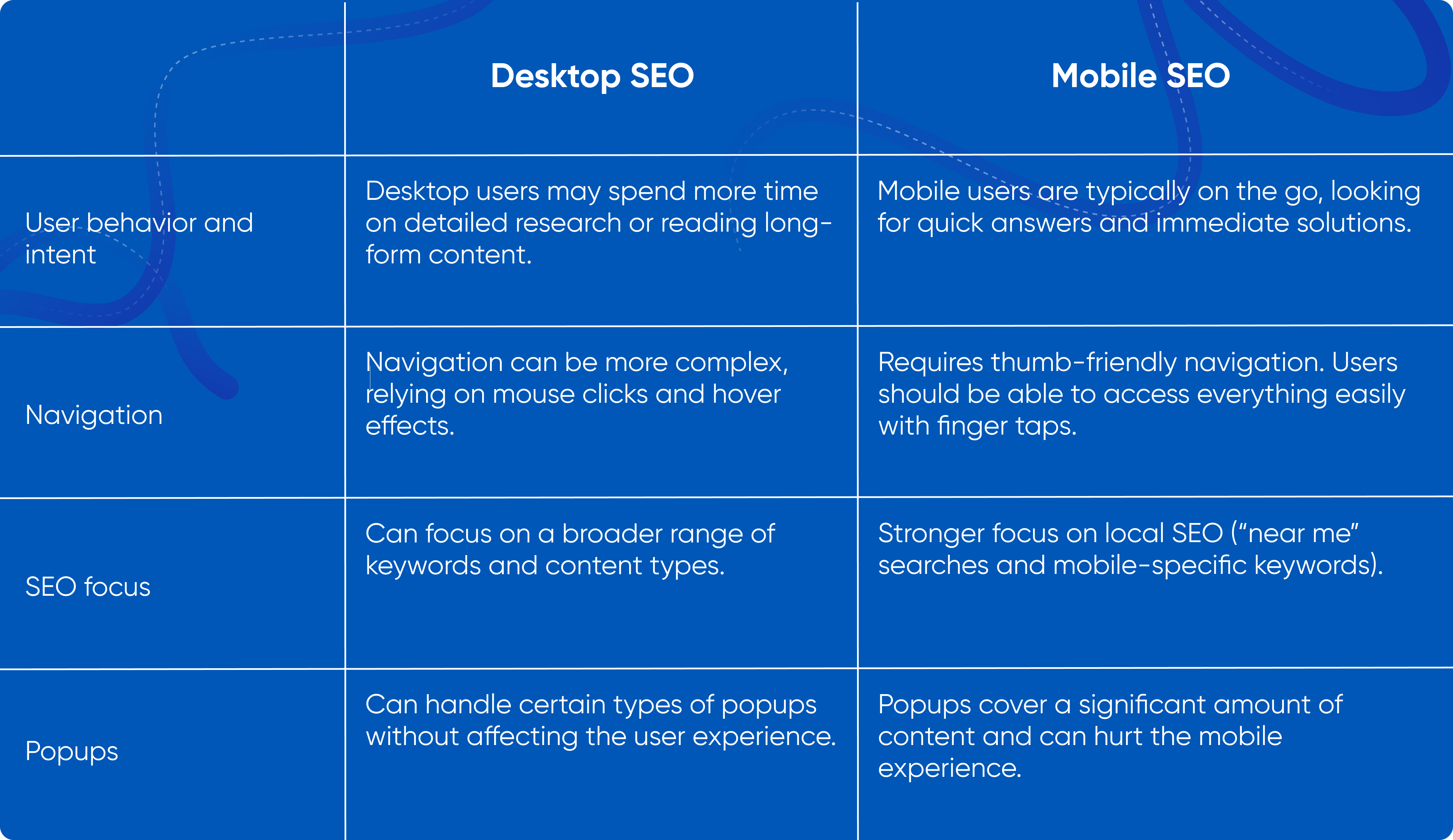
What do you usually do when you have a question?
If you're like most people, you probably use your phone to Google the answer. In fact, in 2023, more than half of global web traffic will come from smartphones. So optimizing your website for mobile users is crucial.
Additionally, in 2020, Google moved to mobile-first indexing, which means that its algorithms primarily use the mobile version of your site to index and rank it. This makes mobile SEO even more important if you want your website to rank high on search engine results pages (SERPs).
With that in mind, here are eight mobile SEO tips to help you improve your rankings across all devices and grow your business.
What is Mobile SEO?
Mobile search engine optimization refers to the process of optimizing your website to rank high in mobile search results. This is to ensure that your website not only looks great on small screens, but also provides a great experience for mobile users.
Key Differences Between Desktop and Mobile SEO
Although desktop and mobile SEO share common goals, you need to use different strategies to account for the different characteristics and user behaviors associated with each device.
Here are some key differences:

Why is Mobile SEO Important?
Most people prefer to search using their mobile devices and this number is increasing over the years. According to Stat Counter, 57.87% of all searches in 2023 will be on mobile devices. Mobile SEO ensures that your website serves this ever-growing audience.
In addition, in September 2020, Google switched to mobile indexing of all websites. This means that Google now primarily uses the mobile version of your site for indexing and ranking purposes. In other words, the performance of the mobile version of your site and the quality of the content are the main factors in how your site ranks in the search engine.
How to check if your site is optimized for mobile devices
Like most people, you've probably used Google's mobility test to check if your website is optimized for mobile users.
However, in December, Google stopped supporting the Mobile Testing API, the Google Search Console Mobile Usability Report, and the Mobile Testing Tool.
The technology company has combined these tools into a single platform called Lighthouse, which you can use to test aspects of mobile usability such as page load speed, mobile navigation and content relevance.
However, there are other ways to check if your site is optimized for mobile devices. Let's look at three of them.

Manual verification on different devices and browsers
Open your site on your smartphone or tablet and see how it looks, how fast it loads and how easy it is to navigate. Also, test your website on popular browsers like Chrome, Safari and Firefox.
Mobile SEO Tips
Now let's take a look at eight mobile SEO tips that will help you improve your rankings and increase your mobile traffic.
1. Create a mobile-friendly website
Our first SEO tip is to create a mobile-friendly site, which you can do in four ways:
Method 1: Responsive Website Design
Responsive design means that your website layout adapts perfectly to the screen size of the user's device – whether it's a desktop computer, tablet or smartphone.
Method 2: Site dynamism
A dynamic service generates different HTML versions of your site depending on which device is requesting the page. but uses the same page URL.
Method 3: Use separate URLs
This is where you combine separate URLs for the mobile and desktop versions of your website. For example, you can have m.example.com for mobile and www.example.com for desktop.
Method 4: Web Responsive Outsourcing
MYGO can create a user-friendly and search engine optimized website for you. The company targets relevant keywords to improve your visibility in search engines to drive quality traffic to your website.
2. Optimizing your website's loading speed
Users expect your website to load quickly. In this sense, a slow loading website may result in losing the target audience. Bounce rate increases by 32% if your page load time increases from one to three seconds.
Search engines like Google prioritize user experience. They recognize that users prefer a fast loading website. So, a faster website means a higher chance of a higher search engine ranking.
With that in mind, here are some ways to improve your website's load time:
1. Compressing the images on the site.
2. Minify your site's code (CSS, JavaScript and HTML).
3. Use browser caching.
3. Make your site content mobile-friendly
Audiences will stay longer on your site if they can easily read the content on the site. which increases their delay time on the site.
Here are some examples of mobile-friendly content:
1. Use white space: Use white space between elements on your web page. This makes your content easy to understand and less cluttered.
2. Use Short Paragraphs: Instead of long paragraphs, break your content into shorter, more manageable chunks.
3. Use a large, easy-to-read font. Choose fonts that are easy to read on mobile devices.
4. Easy site navigation
Users often use mobile devices with only one hand. Therefore, the navigation of the site should be adjusted so that they can easily find the desired information.
If mobile visitors find it difficult to navigate your website, they are likely to leave and never return. Result? Low engagement rates that could potentially hurt your search engine rankings.
Simple navigation reduces this risk and keeps visitors on your website longer.
Here are some tips for easy navigation:
1. Stick to basic menu items that represent the main content of your website, as too many options can confuse the user.
2. Use the hamburger menu, which is usually located in the upper right corner. It hides the navigation menu and brings it up only by tapping on it.
3. Place a search function on your site that will allow visitors to quickly find specific information on your website.
5. Use chart marking
Schema markup gives structure to the content of your website to search engines, helping them to easily rank and index it. This results in improved visibility and ranking.
6. Voice search optimization
With digital assistants like Siri and Alexa, more people are using voice commands to search online.
According to the Smart Audio Report, 62% of American adults use voice assistants on devices such as smartphones, smart speakers and car systems. Meanwhile, 27% of Internet users globally use voice search on mobile.
7. Reduce the use of popups on mobile
While Popups can be a powerful tool for conversions, they can also be irrelevant on mobile devices.
Mobile device screens are smaller, so Popups windows are not appropriate on mobile versions. They can obscure the entire content of the page and lead to accidental clicks, reducing the overall user experience.
If you must add popups to your site, make the close button visible and easy to click.
8. Local SEO optimization
Optimizing your website for local search is a great way to connect with your local audience.
Searches with local intent often have a higher conversion rate because people looking for something "near me" are usually looking to make a purchase. In fact, 76% of consumers who use smartphones to find local businesses visit a business during the day, and 28% of those make a purchase.
With that in mind, here's how to optimize your site for local SEO:
1. List your business on Google My Business. Update your profile with accurate information, including phone number, address and business hours.
2. Use keywords in mobile content, metadata, and URLs that reflect local search queries, such as your city, area, and other local identifiers.
summary
Now that you know why mobile SEO is important and how it can improve your search engine rankings, it's time to implement the strategies we've discussed to increase your organic traffic.
MYGO can create a mobile-optimized website that fits your design and marketing needs.
Contact us today to find out how we can improve your search engine rankings and grow your business.